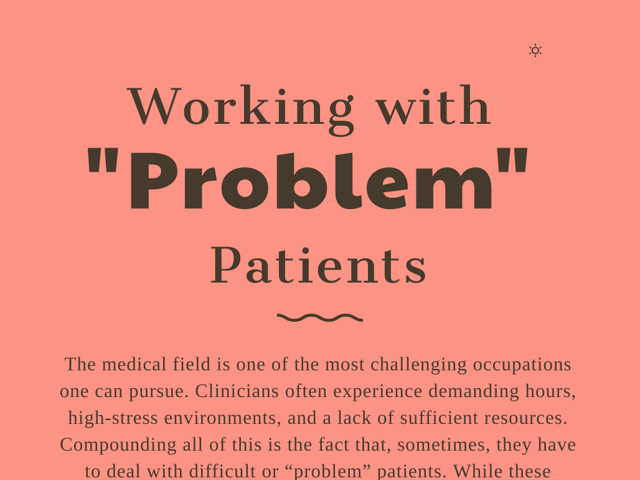
Nursing: Working with “Problem” Patients
The medical field is one of the most challenging occupations one can pursue. Clinicians often experience demanding hours, high-stress environments, and a lack of sufficient resources. Compounding all of this is the fact that, sometimes, they have to deal with difficult or “problem” patients. While these experiences can be emotionally draining, there are some key strategies to remember when encountering problem patients.
You’re on the Same Side
Remember that you are both on the same team and your goal is to combat their ailments. Often, problem patients can insist on diagnoses/treatments that may be inconsistent with their presentation and suspected condition. In these instances, remember that there is no need for either of you to “win” the conversation. Taking a cooperative approach and reminding the patient of your expertise and overarching concern for their well-being is often met with a much more cooperative relationship.
Empathy Goes a Long Way
It’s also crucial to approach patient interactions with a high degree of empathy and patience. While patients are frequently upset, anxious or emotional—which can make them harder to reason with—it’s important to remember that they are away from home and frequently in pain and/or scared. Showing empathy while remaining calm can help to promote the patient’s sense of feeling respected and having confidence in your ability to treat them successfully.
Stay Cool
One common issue is letting the patient “get under your skin.” It’s easy to meet anger with anger or walk away from a challenging encounter feeling defeated, but remember to set boundaries with a patient or walk away, if necessary. Let them know you will be back to check on them after a set amount of time. This will allow both of you to clear your heads and approach the situation with renewed energy.
It’s Worth the Effort
Difficult patients are a part of the medical field; there is simply no avoiding it. But remember that your goal is to treat the patient both physically and emotionally. Their state-of-mind is an important factor in the overall interaction as well as their likelihood of staying compliant with treatment. On the flip side of the spectrum, if you do not handle patient interactions well, it can open the door to legal complaints and liability. Having a strong bedside manner is one of the most important aspects of being a trusted clinician. Though even the most patient clinicians will sometimes encounter patients that will still rattle them, knowing when to shake it off and move forward in a positive manner will be a valuable asset—and will help you to have many more positive patient interactions.

Keep Reading

Certified Nursing Assistant Exam Blog
How Long Does it Take to Become a CNA?
As a profession on the frontline of healthcare, Certified Nursing Assis…

Certified Nursing Assistant Exam Blog
How to Do Well on the CNA Skills Test
Over 1.3 million nursing assistants work in our healthcare system today…

Certified Nursing Assistant Exam Blog
What Does a Nursing Assistant (CNA) Do?
Are you interested in exploring medical careers? The healthcare industr…